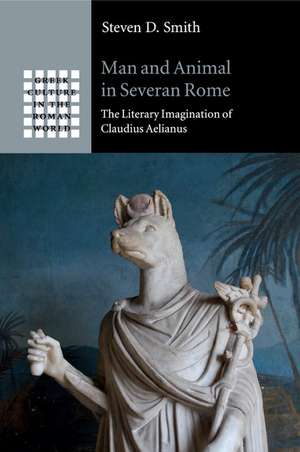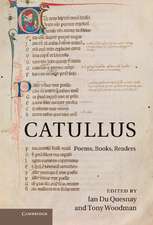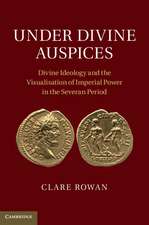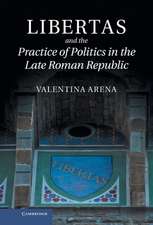Man and Animal in Severan Rome: The Literary Imagination of Claudius Aelianus: Greek Culture in the Roman World
Autor Steven D. Smithen Limba Engleză Paperback – 5 apr 2017
| Toate formatele și edițiile | Preț | Express |
|---|---|---|
| Paperback (1) | 258.43 lei 6-8 săpt. | |
| Cambridge University Press – 5 apr 2017 | 258.43 lei 6-8 săpt. | |
| Hardback (1) | 698.50 lei 6-8 săpt. | |
| Cambridge University Press – 23 iul 2014 | 698.50 lei 6-8 săpt. |
Din seria Greek Culture in the Roman World
-
 Preț: 215.75 lei
Preț: 215.75 lei -
 Preț: 201.39 lei
Preț: 201.39 lei -
 Preț: 315.25 lei
Preț: 315.25 lei -
 Preț: 230.58 lei
Preț: 230.58 lei -
 Preț: 290.96 lei
Preț: 290.96 lei -
 Preț: 235.13 lei
Preț: 235.13 lei - 8%
 Preț: 530.68 lei
Preț: 530.68 lei -
 Preț: 286.30 lei
Preț: 286.30 lei -
 Preț: 206.57 lei
Preț: 206.57 lei - 14%
 Preț: 733.20 lei
Preț: 733.20 lei - 14%
 Preț: 755.69 lei
Preț: 755.69 lei -
 Preț: 287.28 lei
Preț: 287.28 lei -
 Preț: 401.19 lei
Preț: 401.19 lei -
 Preț: 320.90 lei
Preț: 320.90 lei -
 Preț: 364.80 lei
Preț: 364.80 lei - 11%
 Preț: 695.06 lei
Preț: 695.06 lei -
 Preț: 324.03 lei
Preț: 324.03 lei -
 Preț: 324.40 lei
Preț: 324.40 lei - 14%
 Preț: 777.00 lei
Preț: 777.00 lei -
 Preț: 325.01 lei
Preț: 325.01 lei -
 Preț: 340.34 lei
Preț: 340.34 lei - 11%
 Preț: 698.50 lei
Preț: 698.50 lei -
 Preț: 283.63 lei
Preț: 283.63 lei - 14%
 Preț: 885.74 lei
Preț: 885.74 lei -
 Preț: 323.05 lei
Preț: 323.05 lei - 14%
 Preț: 768.27 lei
Preț: 768.27 lei -
 Preț: 448.80 lei
Preț: 448.80 lei -
 Preț: 287.48 lei
Preț: 287.48 lei - 14%
 Preț: 766.25 lei
Preț: 766.25 lei -
 Preț: 284.78 lei
Preț: 284.78 lei - 11%
 Preț: 696.26 lei
Preț: 696.26 lei - 11%
 Preț: 695.59 lei
Preț: 695.59 lei - 14%
 Preț: 689.49 lei
Preț: 689.49 lei -
 Preț: 423.61 lei
Preț: 423.61 lei - 11%
 Preț: 694.04 lei
Preț: 694.04 lei - 14%
 Preț: 758.22 lei
Preț: 758.22 lei - 11%
 Preț: 704.99 lei
Preț: 704.99 lei
Preț: 258.43 lei
Nou
Puncte Express: 388
Preț estimativ în valută:
49.45€ • 51.77$ • 40.92£
49.45€ • 51.77$ • 40.92£
Carte tipărită la comandă
Livrare economică 05-19 aprilie
Preluare comenzi: 021 569.72.76
Specificații
ISBN-13: 9781108401937
ISBN-10: 1108401937
Pagini: 320
Ilustrații: 11 b/w illus.
Dimensiuni: 152 x 230 x 16 mm
Greutate: 0.43 kg
Editura: Cambridge University Press
Colecția Cambridge University Press
Seria Greek Culture in the Roman World
Locul publicării:Cambridge, United Kingdom
ISBN-10: 1108401937
Pagini: 320
Ilustrații: 11 b/w illus.
Dimensiuni: 152 x 230 x 16 mm
Greutate: 0.43 kg
Editura: Cambridge University Press
Colecția Cambridge University Press
Seria Greek Culture in the Roman World
Locul publicării:Cambridge, United Kingdom
Cuprins
Introduction. Approaching the De natura animalium; 1. The independent intellectual; 2. Animals and agroikoi in Aelian's Rustic Letters; 3. The hazards of variety; 4. The Hellenized Roman; 5. Stoicism; 6. Animals, divinity, and myth; 7. Egypt and India; 8. The sexual animal; 9. Bees, lions, eagles: Aelian and kingship; 10. After animals: the women of the Varia Historia; Conclusion. 'Nature produces animals with many voices and many sounds, you might say ...'; Appendix: reconstructing Aelian's Katêgoria tou Gunnidos.
Recenzii
'Smith compellingly argues that Aelian discusses the desire of animals to provide a moral commentary on human society … [T]hose interested in Roman Hellenism and the intellectual world of Severan Rome will welcome [this] book.' M. L. Goldman, Choice
'Smith gives us a compelling, incisive and thought-provoking tour of Aelian's thought. Smith's Aelian is well worth knowing.' Tom Hawkins, Histos
'Man and Animal in Severan Rome is an exciting and imaginative study …' C. W. Marshall, Bryn Mawr Classical Review
'The social and political implications of animal representations rightfully play a paramount role in all of Smith's book. A rich multilingual bibliography is used to throw new light on Aelian's masterpiece and the sophistic culture of the Severan period.' Fabio Tutrone, American Journal of Philology
'This is a welcome study of a neglected author. Recent editions and translations have made Aelian's works considerably more accessible, but there have been still have few specialized studies devoted to him. Smith offers the first monograph-length study of Aelian in English, and the first in any language to include coverage of his three extant works: On the Nature of Animals, Varied History, and Rustic Letters. Smith's book therefore fulfills a long-standing need for a thorough treatment of Aelian, and for a reconsideration of his work in light of new approaches to Imperial Greek literature.' Jared Secord, The Classical Journal
'In this sophisticated book Aelian comes across as a hero with a universalizing literary project who combines an emphatic gaze on animals with a critical gaze on human culture and morality. Smith demonstrates deep insight into the age of this author, who has frequently been underestimated, not least, perhaps, because his topic is animals. Smith makes a convincing case for reading De natura animalium as a critique of Severan Rome, and he opens the reader's eyes to its ambiguities and anxieties in a fascinating way. The book is recommended for all who are interested in Roman culture and history, and especially those who study Roman literature and the literary imagination, as well as to students of ancient conceptions and uses of animals. I think they will enjoy it.' Ingvild Saelid Gilhus, Classical World
'Smith gives us a compelling, incisive and thought-provoking tour of Aelian's thought. Smith's Aelian is well worth knowing.' Tom Hawkins, Histos
'Man and Animal in Severan Rome is an exciting and imaginative study …' C. W. Marshall, Bryn Mawr Classical Review
'The social and political implications of animal representations rightfully play a paramount role in all of Smith's book. A rich multilingual bibliography is used to throw new light on Aelian's masterpiece and the sophistic culture of the Severan period.' Fabio Tutrone, American Journal of Philology
'This is a welcome study of a neglected author. Recent editions and translations have made Aelian's works considerably more accessible, but there have been still have few specialized studies devoted to him. Smith offers the first monograph-length study of Aelian in English, and the first in any language to include coverage of his three extant works: On the Nature of Animals, Varied History, and Rustic Letters. Smith's book therefore fulfills a long-standing need for a thorough treatment of Aelian, and for a reconsideration of his work in light of new approaches to Imperial Greek literature.' Jared Secord, The Classical Journal
'In this sophisticated book Aelian comes across as a hero with a universalizing literary project who combines an emphatic gaze on animals with a critical gaze on human culture and morality. Smith demonstrates deep insight into the age of this author, who has frequently been underestimated, not least, perhaps, because his topic is animals. Smith makes a convincing case for reading De natura animalium as a critique of Severan Rome, and he opens the reader's eyes to its ambiguities and anxieties in a fascinating way. The book is recommended for all who are interested in Roman culture and history, and especially those who study Roman literature and the literary imagination, as well as to students of ancient conceptions and uses of animals. I think they will enjoy it.' Ingvild Saelid Gilhus, Classical World
Notă biografică
Descriere
This book argues that Aelian's highly influential compilation, De natura animalium, offers a sophisticated literary critique of Severan Rome.












